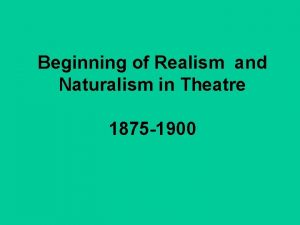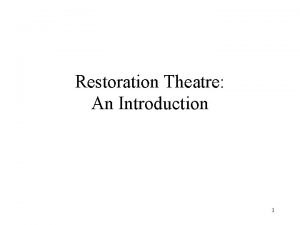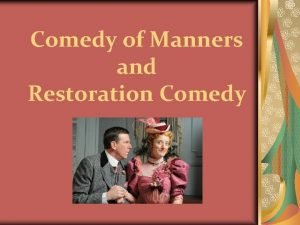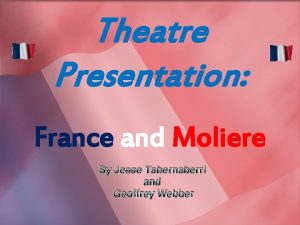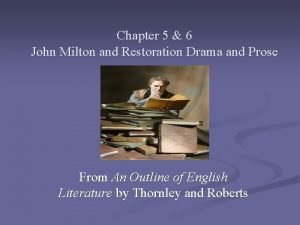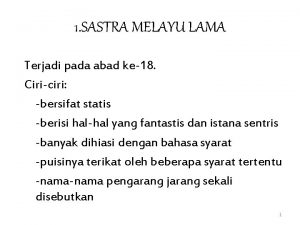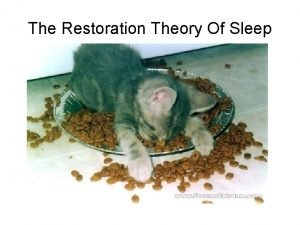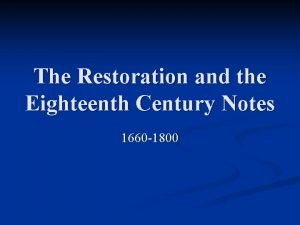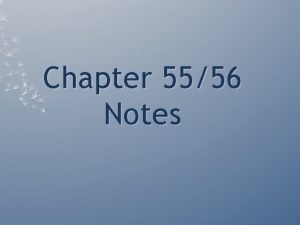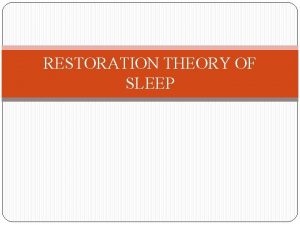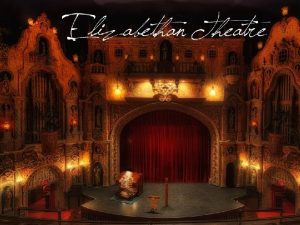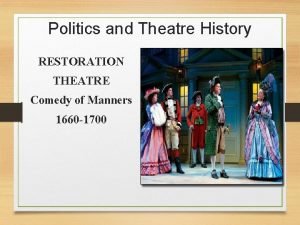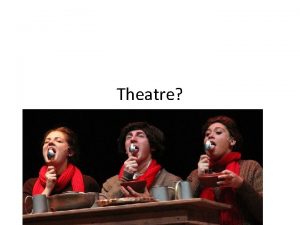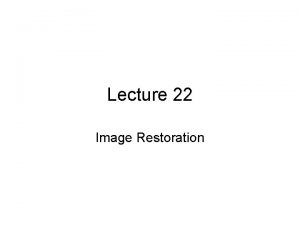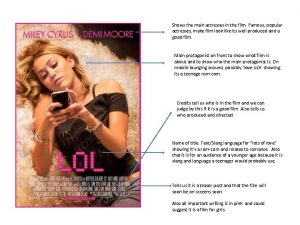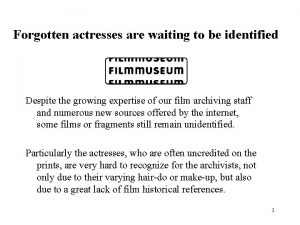Restoration Theatre 2 Female Playwrights and Female Actresses






















- Slides: 22

Restoration Theatre 2: Female Playwrights and Female Actresses Handout on http: //www 2. warwick. ac. uk/fac/arts/engli sh/undergrad/modules/second/en 228/restt heatre 2 handout/ 1

Aphra Behn (1640 -1689) • First female real literary figure • Supported herself by writing: money not glory (though not adverse to latter) Until then: • Women and literary pursuits: dabbling (i) as appropriate to civilised lady (ii) in spite of male criticism of publication 2

Women and Men in 16 th and 17 th Centuries • Brains with very different capacities • Elizabeth I was ‘man-like’ – something remarkable in her sex • In 16 th and 17 th Centuries women were understood to have slimmer understanding and capacity to their male social equals • Aphra Behn accepted as ‘as good’ as the men playwrights who were her peers – great triumph 3

Aphra Behn as proto-feminist? • Personally successful • Paved the way for others to a limited extent • Susannah Centrelivre – actress turned playwright 4

Views of Female Playwrights • Behn considered to have surpassed her sex in her capacity to write plays – an anomaly • Thematic and epistemological ‘femaleness’ detected in the plays written by women • Male sense that women knew more about certain things 5

Susannah Centrelivre ‘that subtlety of spirit which is peculiar to females of wit, and is very seldom wellperformed by those of the other sex, in which craft in love is an act of invention, and not, as with women, the effect of nature and instinct. ’ Richard Steele in a review of The Busie Bodie (1709) 6

Preface to The Busie Bodie (1709) ‘And here, my Lord, the occasion seems fair for me to engage in a panegyric upon those natural and acquired abilities which so brightly adorn your person: but I shall resist that temptation, being conscious of the inequality of a female pen to so masculine an attempt. ’ 7

Thomas Baker’s Prologue to The Busie Bodie Since war, and places, claim the bards that write, Be kind, and bear a Woman’s treat tonight; Let your indulgence all her fears allay, And none but woman-haters damn this play. 8

Aphra Behn Biography 1 • ‘her colourful and mysterious life has swallowed up attention at the expense of her writing. ’ Jane Spencer • Trip to Surinam in 1663 -4 • Acting as spy in the Netherlands 1665 -6. Did warn the government of the raid on the Thames in 1666, but they ignored her! 9

Aphra Behn Biography 2 • Spurious tradition that she was the illegitimate daughter of Lady Mary Sidney Wroth (Sir Philip Sidney’s niece) which would provide her with a literary pedigree • Probably fell into theatre as a result of her ardent Royalism – see The Rover 1 (1677) and 2 (1681) for evidence of this 10

Aphra Behn Biography 3 • Both Davenant and Killigrew knew Behn before she was a playwright: Killigrew got her the spying job; she was great friends with Davenant’s nextdoor neighbour. • Jane Spencer suggests she was an adapter of plays before her first success in 1670, The Forc’d Marriage. • Often women did not sign plays, so it is possible she was active during 1667 -70 as a jobbing adapter 11

Behn and proto-feminism (again) 1 • Suggestions that Lady Davenant was responsible for Behn’s rise as an independent playwright • Behn’s political views meshed well with her protofeminism. • Royalist Toryism gave women unheard of freedom and independence – easy sexuality of Carolean court gave some women substantial political clout. 12

Behn and proto-feminism (again) 2 • Royalist court tradition of educated ladies • Atmosphere of sexual openness • Political power of the wives and mistresses of the nobility and royalty • Mercantile city thought women were part of the merchandise – concentration on chastity operated in favour of men’s tendency to buy and sell women • Both parts of The Rover reflect the idea that money and love are related, but reject the notion that women should be bought and sold 13

Repartee • The verbal equivalent of the struggle for sexual and mental superiority between these two characters in any of the comedies – it figures in words what they experience in fact • Dryden: ‘as it is the very soul of conversation, so it is the greatest grace of comedy, where it is proper to the characters. There may be much of acuteness in a thing well said; but there is more in a quick reply “for wit always looks more graceful in reply than in attack. ”’

Night-gowns and breeches • Women in state of undress for bed (Florinda in III. iii): ‘Enter Florinda undress’d…’ • Women dressed as boys, so you can see their legs (Hellena in IV. ii: ‘Enter Hellena, drest in Man’s clothes’). Quotation • Devices to show the actresses’ bodies off

Marquise-Thérèse de Gorla (also known as Mlle Du Parc), an accomplished member of Molière’s company, was praised as a ‘lovely actress, with the bearing of an empress, [who] does everything delightfully, be it in singing or dancing’. Another contemporary fantasised about her remarkable cabrioles – for one could see her legs and part of her thighs through the slit in her skirt, as well as her silk hose attached to her tights. [1] Similar to a Restoration actress in a breeches part, Du Parc invited a titillating glance at her legs. [1] Jean Loret, Muze historique, letter, 1661, and a retrospective ‘Lettre sur les comédiens’, Mercure de France (May 1740), cited in Barbara Ravelhofer’s forthcoming OUP monograph on early modern dance. Back

Quintilian • Urbanitas: the language of the cities and of learning • Venustus: graceful, charming • Salsus: salty, piquant • Facetus: polished, elegant

The Rover Part 2 (1681) Act I, scene i: ‘since I lost my little charming gypsy, nothing has gone so near my heart’ ‘Ay – she was too good for mortals’ (with a sham sadness) 18

La Nuche ‘But when I’ve worn out all my Youth and Beauty, and suffered every ill of poverty, I shall be compelled to begin the world again without a stock to set up with; no faith, I’m for a substantial Merchant in love, who can repay the loss of time and Beauty: with who to make one thriving voyage sets me up for ever, and I need never put to Sea again’. The Rover Part 2, V. i. 124 -8 19

Willmore ‘I’ll have thee poor, and mine; Tis nobler far, to starve with him thou lov’st, Than gay without, and pining all within. ’ The Rover Part 2, V. i. 45 -7 20

Peter Holland, The Ornament of Action ‘Willmore is forced to marry Hellena, but his bargain with La Nuche is achieved without marriage – a reflection of the degradation of the heroine into a prostitute (no rake marries a whore and remains hero) and of the increasingly extra-social position of the rake in the comedies of the 1680 s’ page 68. 21

Willmore’s Endings To Beaumond: ‘You have a hankering after marriage still, but I am for Love and Gallantry. ’ V. i. 610 ‘So tho by several ways we gain our End, Love still, like death, does to one centre tend. ’ 22
 Naturalism in plays
Naturalism in plays Medieval theatre mansions
Medieval theatre mansions Karin kovar
Karin kovar First actor in greek theatre
First actor in greek theatre Restoration comedy comedy of manners
Restoration comedy comedy of manners Anne bollyn
Anne bollyn Moliere presentation
Moliere presentation French renaissance theatre history
French renaissance theatre history Restoration drama and prose
Restoration drama and prose Image restoration is to improve the dash of the image
Image restoration is to improve the dash of the image Chapter 56 conservation biology and restoration ecology
Chapter 56 conservation biology and restoration ecology Phosphorus cycle pearson education
Phosphorus cycle pearson education Restoration drama and prose
Restoration drama and prose Image sharpening in digital image processing
Image sharpening in digital image processing The restoration and 18th century literature
The restoration and 18th century literature The restoration refers to
The restoration refers to Repair and restoration theory of sleep
Repair and restoration theory of sleep The restoration and the 18th century notes
The restoration and the 18th century notes Polishing of amalgam restorations should be
Polishing of amalgam restorations should be Chapter 55 ecosystems and restoration ecology
Chapter 55 ecosystems and restoration ecology Repair renovation and restoration of water bodies
Repair renovation and restoration of water bodies The restoration and the last stuarts
The restoration and the last stuarts Repair and restoration theory of sleep
Repair and restoration theory of sleep
